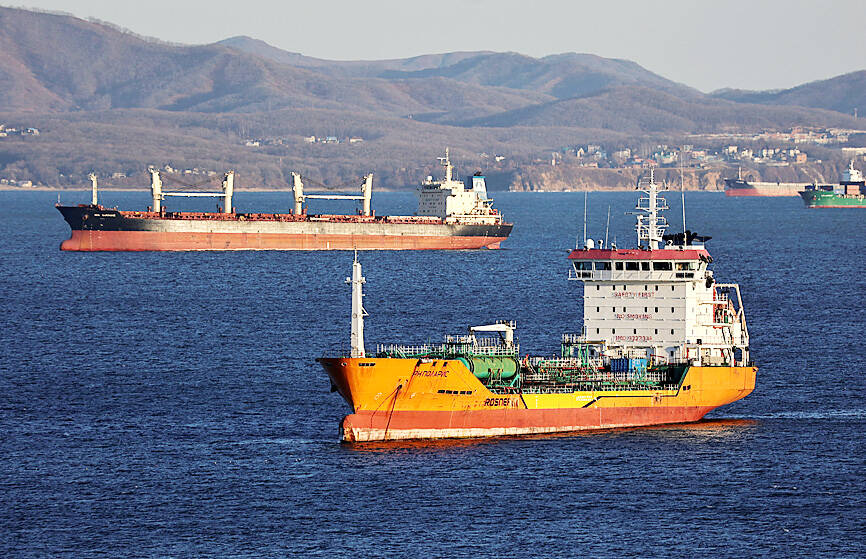The G7 price cap on Russian seaborne oil came into force yesterday as the West tries to limit Moscow’s ability to finance its war in Ukraine, but Russia has said it would not abide by the measure even if it has to cut production.
The price cap, to be enforced by the G7 nations, the EU and Australia, comes on top of the EU’s embargo on imports of Russian crude oil by sea and similar pledges by the US, Canada, Japan and the UK.
It allows Russian oil to be shipped to third-party nations using G7 and EU tankers, insurance companies and credit institutions, only if the cargo is bought at or below the price cap.

Photo: Reuters
As the world’s key shipping and insurance firms are based in G7 nations, the cap could make it difficult for Moscow to sell its oil for a higher price.
Russia, which is the world’s second-largest oil exporter, on Sunday said that it would not accept the cap and would not sell oil that is subject to it, even if it has to cut production.
Selling oil and gas to Europe has been one of the main sources of Russian foreign currency earnings since Soviet geologists found oil and gas in the swamps of Siberia in the decades after World War II.
A source who asked not to be identified due to the sensitivity of the situation said that a decree was being prepared to prohibit Russian companies and traders from interacting with nations and companies guided by the cap.
In essence, such a decree would ban the export of oil and petroleum products to nations and companies that apply it.
Still, with the price cap set at US$60 per barrel, not much below the US$67 level where it closed on Friday, the EU and G7 expect Russia to still have an incentive to continue selling oil at that price, while accepting smaller profits.
The Chinese Ministry of Foreign Affairs yesterday said that Beijing would continue its energy cooperation with Russia on the basis of respect and mutual benefit, following the EU’s agreement of the price cap, Russia’s RIA news agency reported.
The level of the cap is to be reviewed by the EU and G7 every two months, with the first such review in the middle of next month.

OPTIMISTIC: The DGBAS sharply upgraded its GDP growth estimate from 3.54 percent to 7.71 percent after the Taiwan-US trade agreement signing and given AI optimism The US imported more from Taiwan than China for the first time in decades, as US President Donald Trump’s tariffs reshape trade flows while a global boom in artificial intelligence (AI) fuels demand for tech products. US purchases of goods from China plunged almost 44 percent in December last year from 2024 to US$21.1 billion, US Department of Commerce data showed on Thursday. By contrast, shipments from Taiwan more than doubled during the same period to US$24.7 billion. The soaring Taiwanese shipments to the US reflect the huge expansion in supplies of chips and servers for AI companies, which has completely changed

NON-NEGOTIABLE: The US president’s action ran counter to one of the US’ ‘six assurances’ on not consulting China about arms sales to Taiwan, US lawmakers said US President Donald Trump’s admission that he is discussing arms sales to Taiwan with Chinese President Xi Jinping (習近平) is “alarming and a blatant violation of US policy and the six assurances,” US Representative Ro Khanna said on Tuesday. Trump on Monday said he would decide soon on whether to send more weapons to Taiwan, after Xi warned him not to do so. “I’m talking to him about it. We had a good conversation, and we’ll make a determination pretty soon,” Trump told reporters aboard Air Force One when asked about warnings raised by Beijing during a phone call with Xi over

US and Chinese fighter jets briefly faced off above waters near the Korean Peninsula this week, Yonhap News agency reported, marking a rare confrontation in that area between the two superpowers. About 10 US fighter jets on Wednesday departed an airbase in Pyeongtaek, South Korea, for drills above international waters off South Korea’s western coast, the news outlet cited unidentified military sources as saying. While the US planes did not enter China’s air defense identification zone, Beijing scrambled planes as they neared that region, the report said. “The Chinese People’s Liberation Army organized naval and air forces to monitor and effectively respond

VACILLATING? Some US officials are concerned that Trump’s April visit to Beijing might be affected if Washington pushes through additional weapons sales to Taiwan A major US arms sales package for Taiwan is in limbo following pressure from Chinese President Xi Jinping (習近平) and concerns among some US officials that greenlighting the deal would derail US President Donald Trump’s upcoming visit to Bejing, the Wall Street Journal (WSJ) reported on Wednesday. Trump on Monday said that he would decide soon on whether to send more weapons to Taiwan, after Xi warned him not to do so. “I’m talking to him about it. We had a good conversation, and we’ll make a determination pretty soon,” Trump told reporters aboard Air Force One when asked about warnings raised